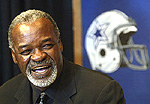09.29.06

How Good A Boss Are You? Take This Test
 Fortune magazine has provided a short online quiz to help you determine if you are a good boss or a bad boss. It's part of an article by senior writer, Anne Fisher. Fortune magazine has provided a short online quiz to help you determine if you are a good boss or a bad boss. It's part of an article by senior writer, Anne Fisher.
She spoke to David Sirota, head of Sirota Survey Intelligence, who said, "A large part of what a good boss does is expedite things for employees - that is, help them get their jobs done by removing obstacles. This is not at all the same as 'making sure' they get their jobs done by raising the anxiety level. Most people are anxious enough already." She asked him, What makes a good boss, in employees' eyes? Here is an excerpt:
"All of our research consistently shows that people in general have three goals at work. First is fairness. They want to feel that they're being recognized and rewarded fairly for what they contribute. Second is achievement. People want to be proud of the organization and of their place in it. And third, camaraderie, meaning good working relationships and a sense of belonging to a team. If these three goals are met, you have enthusiastic employees.
The trouble is that, in most companies, morale among new hires is high and then, by about the six-month point, it has dropped sharply. Management has destroyed it. One thing bad bosses do is to deliberately make people feel insecure about their jobs. Another is, treat employees like children or criminals instead of like responsible adults.
A sign of a really bad boss is micromanaging, which I define as devoting punitive amounts of attention to minutiae. We've seen workplaces where people have to raise their hands if they want to go to the restroom. Another sign of a bad boss is when you hear employees say that they get no positive feedback at all. A common complaint is, "If we make a mistake, we hear about it, but for doing our jobs well, there is never a 'thank you'.
How good a boss are you? A good manager understands how employees feel about their jobs. You may think you understand what your workers want, but do you really know what motivates them? Take the Fortune quiz!

  Like us on Instagram and Facebook for additional leadership and personal development ideas.
Posted by Michael McKinney at 06:15 PM
Permalink
| Comments (0)
| Weekend Supplement

Danny Meyer: Enlightened Hospitality
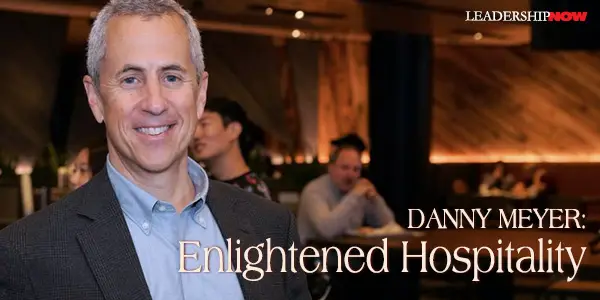 N
NEW YORK Restaurateur Danny Meyer believes that business, like life, is all about how you make people feel. In his new book Setting the Table, he emphasizes putting the power of hospitality to work in a new and counterintuitive way: The first and most important application of hospitality is to the people who work for you, and then, in descending order of priority, to the guests, the community, the suppliers, and the investors. This way of prioritizing stands the more traditional business models on their heads, but Danny considers it the foundation of every success that he and his restaurants have achieved.
He told the New York Times in a recent interview, “Show me three world-class art museums with equally good art and one of them will always have friendlier guards than the other two. That’s the one I’m the most likely to return to."
|
| The Meyer Model |
| Hospitality is key: Virtually nothing else is as important as how one is made to feel in any business transaction. |
| Strive for shared ownership: When guests talk about a restaurant as if it's theirs, they can't wait to share it with friends. |
| Invest in your community: A business that understands the power of creating wealth for the community stands a much higher chance of creating wealth for its own investors. |
| Know thyself: Before you go to market, know what you are selling and to whom. Be the best you can be within a reasonably tight product focus. |
| Be generous: It's almost always worth bearing a higher short-term cost if you want to win in the long run. |
* * *  Follow us on Instagram and Twitter for additional leadership and personal development ideas.
* * *


 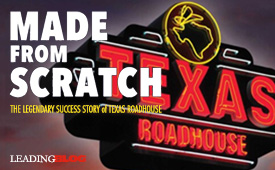
Posted by Michael McKinney at 12:01 AM
Permalink
| Comments (0)
| Books
09.28.06

Ethics: Reinforcing Fixed Points
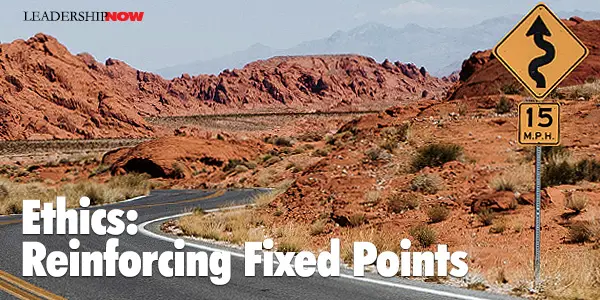 H
HERE IS A GOOD comment on the dynamics of ethics in a changing world from The Ethical Challenge (2003) in a chapter entitled Ethics, Virtuousness, and Constant Change by Kim Cameron, professor at the University of Michigan Business School:
 When nothing is stable—when they have no fixed points, dependable principles, or stable benchmarks—people tend to make up their own rules. They make sense of the ambiguity and chaos they experience by deciding for themselves what is real and what is appropriate.
When nothing is stable—when they have no fixed points, dependable principles, or stable benchmarks—people tend to make up their own rules. They make sense of the ambiguity and chaos they experience by deciding for themselves what is real and what is appropriate.
Recently, it has become clear that in high-pressure, high-velocity environments, some people in the energy-trading, telecommunications, and accounting industries simply made up their own rules. They ended up cheating, or lying, or waffling not only because it was to their economic advantage but because they had created their own rationale for what was acceptable. Conditions were changing constantly, and they let their rules change with them.
The danger of constantly changing conditions illustrates why ethics, values, and principles are more important now than ever. They serve as fixed points. They determine what is right and wrong, appropriate and inappropriate, on a universal basis, every time.
* * *  Like us on Instagram and Facebook for additional leadership and personal development ideas.

 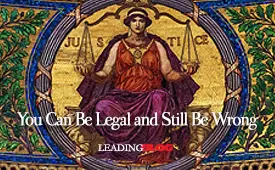
Posted by Michael McKinney at 12:05 AM
Permalink
| Comments (0)
| TrackBacks (1) | Ethics

B-Schoolers Are More Likely to Cheat Than Other Students

The results of a study on cheating by graduate students were reported by Business Week. In it they found that B-school students are more likely to cheat than their counterparts in other disciplines. This doesn't speak well for the men and women that will soon be given positions of "leadership" in the business world. Honesty isn't something that can be compartmentalized—something you can turn off and on. In any culture, honesty is regarded as one of the most—if not the most—important quality of a leader. Without it you can't lead.
- A Crooked Path Through B-School?
by Francesca Di Meglio in Business Week
Excerpts: "A study released this month by researchers found that B-school students were more likely to cheat, or at least to admit to cheating, than students in other graduate programs. And schools are fighting back, with ethics codes, pledges, and, in some cases, a zero-tolerance policy.
According to the researchers, 56% of graduate business students admitted to cheating one or more times in the past academic year, compared to 47% of nonbusiness students.
Most educators agree that teaching aspiring MBAs to handle ethical dilemmas is fundamental because it will determine future practices in real business. Cheating or corruption in the corporate world might offer great results at first, but it will eventually have a catastrophic impact on the bottom line.
"Without trust, honor, and integrity, business can't function for the long term," says Richard Brownlee, professor of business administration at Darden. And the company's name isn't the only one at stake when you make a poor ethical decision. Whether in B-school or at work, say educators, your reputation is only as good as your actions."
- Solutions? See these posts on Cheating and Personal Happiness and The Fight Against Cheating from the BizDeans Talk blog.
Here's a quote from Santiago Iniguez, Dean of Instituto de Empresa Business School:
"To start with, there is a need of clarifying a conceptual issue. Normally, cheating is considered a reproachable behaviour because, as the Oxford Dictionary explains, cheating is "to act dishonestly or unfairly in order to gain an advantage". However, the first person who loses out is the cheater: first, by potentially exposing one’s personal reputation to be affected, sometimes for life; and second, and more importantly from a personal point of view, for relinquishing all the benefits that bring the learning process. The expression "You are only fooling yourself" springs to mind. We all know the intellectual satisfaction that results from understanding, memorizing, rationalizing and discussing theories, ideas, and concepts. Those who take the shortcut and skip the wonders of learning are giving up a decisive part of personal development that is directly linked—I believe, in line with many philosophers—with happiness."
* * * |
Posted by Michael McKinney at 12:01 AM
Permalink
| Comments (0)
| Ethics
, NewsWire
09.27.06

Challenge Assumed Constraints
Between us and where we want to be is something standing in our way. What do you believe is restricting you? Ken Blanchard states the first skill of a self-leader is to challenge assumed constraints. He defines an assumed constraint as, “a belief, based on past experience, that limits current and future experiences.” He explains in his new book, Leading at a Higher Level:
Indicators that an assumed constraint may be holding you hostage are negative internal dialogue, excuses, and blaming statements. At one time or another, most of us have assumed that because we did not have direct authority or position power, we could not be leaders or influence outcomes. This is one of the most common constraints in the workplace.
This is not to say that all of us aren’t constrained by outside forces, whether it’s a lack of time, money, or position of authority. Yet self leadership teaches that the constraints are not the problem; the problem is that we think these things are the only sources of power that are available to us. Every successful person can almost name the time and date when they decided to let go of an assumed constraint.
Chris Barez Brown put it well in How to Have Kick-Ass Ideas, " Stuck is a feeling—never a reality."
Posted by Michael McKinney at 12:17 AM
Permalink
| Comments (0)
| Books
, Personal Development
09.25.06

Doublespeak: Do Companies Really Give a Damn? (CSR)

From the premier issue of Good magazine comes this editorial on the ethics of corproate social responsibility by Jonathan Greenblatt (Co-founder of Ethos Water and a former vice-presdient of consumer products at Starbucks Coffee Company).
- Doublespeak: Do Companies Really Give a Damn?
Here are a few excerpts:
If you read the business press, corporate social responsibility (CSR) is the new new thing. At a time when oil conglomerates are "earning" record profits and the dust is still settling from the Enron verdict, social responsibility has become the latest mantra of corporations looking to redeem their public image. It's now vogue for captains of industry to claim they are motivated not only by a desire for better earnings but also by a desire to save the planet.
Because of such naked deceptions, corporate social responsibility runs the risk of joining other management fads from the ages—in the dustbin. And if treated merely as a cosmetic, it is doomed to fail. The desire to do the right thing must be bound up in the very fabric of a business, helping to guide its efforts to increase revenue or reduce expenses, or else the business will invariably make short-term decisions that drive immediate profits at the expense of good long-term behavior. Authenticity cannot be cooked up after the fact: it must be present from the beginning.
CSR does not stand for Corporate Spin and Rhetoric. It cannot succeed as a marketing plan to placate critics. Companies need to build brands and implement business strategies that are grounded in an ethical framework. When thoughtful behavior inspires a corporation from the start, the company can win on multiple levels. And when managers throughout the organization are rewarded for putting sustainability first, the company has a much better chance of creating success that serves the needs of all stakeholders.
* * * |
Posted by Michael McKinney at 12:31 AM
Permalink
| Comments (0)
| Ethics
, NewsWire
09.22.06

Rayfield Wright: The Road Less Traveled
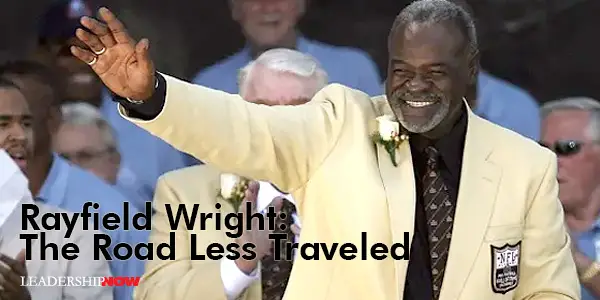 Rayfield Wright
Rayfield Wright, former NFL player with the 1967-1979 Dallas Cowboys, was inducted into the NFL Hall of Fame August 5, 2006. In his enshrinement speech he had these thoughtful words to say:
And to my mother, Mrs. Opel Wright, from the day I was born, you watched me take the road less traveled. Mom, you are my rose garden, you watered each day with your love, with your faith, and with your prayers. Your roots are deeply instilled in me, and your soul is so beautiful, in spite of all the painful thorns that life has put in your way.
Now, parents, teach your children well. Encourage them with your faith and leadership. Remember that you are the windows through which your children see this world. Take notice of yourself and the things that you do in hopes that your example will stir their hearts and souls.
To every young athlete within the sound of my voice, it takes courage to dream your dream. Don't let them sit in the locker room. Take a leap of faith. Listen to your parents and respect your elders. Learn from your successes and your losses. Defeat is possible and as a challenge to do better next time. Be satisfied you gave the game everything that you had and remember this: Don't be afraid to travel the road less traveled because Larry Rayfield Wright did, and you can, too.
* * *  Like us on Instagram and Facebook for additional leadership and personal development ideas.

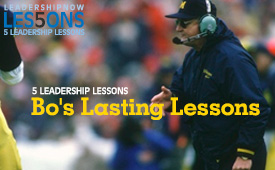 
Posted by Michael McKinney at 06:23 AM
Permalink
| Comments (0)
| Personal Development
09.21.06

Any College Will Do

IN Monday’s Wall Street Journal, Carol Hymowitz wrote an encouraging article entitled, Any College Will Do. She begins, "The college diplomas of the nation's top executives tell an intriguing story: Getting to the corner office has more to do with leadership talent and a drive for success than it does with having an undergraduate degree from a prestigious university.” Here are some highlights:
Most CEOs of the biggest corporations didn't attend Ivy League or other highly selective colleges. They went to state universities, big and small, or to less-known private colleges.
"I don't care where someone went to school, and that never caused me to hire anyone or buy a business," says Warren Buffett, CEO of Berkshire Hathaway, who graduated from the University of Nebraska-Lincoln.
What counts most, CEOs say, is a person's capacity to seize opportunities. As students, they recall immersing themselves in their interests, becoming campus leaders, and forging strong relationships with teachers. And at state and lesser-known schools, where many were the first in their families to attend college, they sought challenges and mixed with students from diverse backgrounds—an experience that helped them later in their corporate climbs.
Inspired by an economics professor who made the subject "fun and relevant," Bill Green, CEO of Accenture, went on to Babson College to earn his bachelor's and M.B.A. degrees. But he credits Dean with teaching him to think analytically, to gain confidence in his abilities, and to learn to work with people.
A.G. Lafley, Procter & Gamble's CEO, chose Hamilton College in Clinton, N.Y., because he wanted a solid liberal arts education and to be assured a spot on the intercollegiate basketball team. A history major who graduated in 1969, he was elected president of his sophomore class, became a fraternity officer, and spent his junior year studying in France. I learned to think, to communicate, to lead, to get things done," he says, adding that those qualities are what he seeks in job candidates at his company. "Any college will do."
 With that in mind, perhaps one should consider a liberal arts education and forgo the pre-professional education. Learning to work with people is what leadership is all about. It could be argued that a liberal arts education better prepares you to do just this. Exposure to a diverse body of knowledge allows a person to connect in more and different ways with more people—a skill that will serve leaders well. A more varied study gives one more context with which to view the world. This in turn can develop a mind better suited to grasp new concepts, form deeper understanding, produce new ideas and make more creative connections. A liberal arts undergraduate degree at your local college or university may be just what you need to prepare you for what Dan Pink describes as a new world in which "right brain" qualities—inventiveness, empathy, meaning—predominate.
* * *  Like us on Instagram and Facebook for additional leadership and personal development ideas.
Posted by Michael McKinney at 01:20 AM
Permalink
| Comments (0)
| Education
09.20.06

Exemplary Leadership
Michael Dingake wrote this piece on leading by example in Mmegi, Botswana's daily independent newspaper. Here is an excerpt:
 Any leader who like my clownish primary school teacher who used to say, "Do as I say, not as I do," cannot be a true leader. Leaders must be role models. Any leader who speaks like my teacher forfeits the role model status and is disqualified for leadership ambitions. Leaders who do not inspire emulation can at best be regarded as incompetents, perhaps clowns on the political stage. Exemplariness is a non-negotiable leadership quality.
[C]an we assume that all leaders at whatever hierarchical rung of leadership, share equal responsibility and are ipso facto expected to display equal exemplary behaviour? The American President, Truman said the buck stops at his door! He meant that the higher the responsibility of office, the higher the level of commitment to other exemplary leadership qualities like independent-mindedness, integrity, courage, impartiality and so forth.
Exemplariness is one of the most important leadership qualities one can think of. In the political arena, the governing party is not on the same social status rung as the parties in opposition for numerous reasons. The governing party is endowed with power, authority influence and resources. Public expectation, trust, hope and demand, is that the party entrusted with such responsibility has to demonstrate exemplary trustworthiness and not abuse the powers, authority and the resources under its control.
Exemplary leadership or leadership deserving of imitation is what Aristotle would call virtue in action. It's authentic. Not just talking the talk, but putting it into action. Our lives must correspond to the truth which we proclaim. Often times this means transcending our own egos. Leadership isn't something you turn off and on. It's a reality you express.
Posted by Michael McKinney at 12:33 AM
Permalink
| Comments (0)
| Government
, Leadership
09.18.06

You Don't Need A Title to Be A Leader
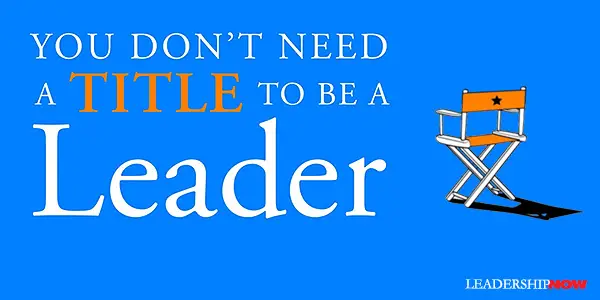
RECENTLY I was talking to a Postal employee about her job. She said that she really saw herself as only a follower. She couldn’t be a leader. She just did her job.
After we talked a bit she began to see that by the “little” things she did everyday, she made profound contributions not only to the Post Office but to the people she worked with. I gave her a copy of this book. It will help her to see even more clearly, the important contributions she makes—her leadership role.
The fact is, no matter whether we have a title or not, we are at one time or another both leaders and followers. This gem of a book will help you and those you come into contact with, not only understand how they lead in various ways, but how they can step up and make more of a contribution—expand their influence.
Mark Sanborn, author of the Fred Factor, has assembled a collection of excellent examples pulled from everyday life to illustrate the important impact we can and do make on those around us.
Here is a short excerpt:
[A] title is not a job description. There are some things that a title can suggest, like having responsibility for others and getting results. It can’t, however, specifically define what a person does. Titles are broad brushstrokes.
It’s impossible for a title or an organizational chart to reflect all the many people who act as leaders or exert leadership throughout the organization. That’s why I call such people “nontitled leaders.” They may or may not have direct responsibility to lead others, yet every day they influence and lead those around them.
Get this book into the hands of those in your organization. Seeing their role in the greater context will give them meaning and quicken their step.
* * *  Like us on Instagram and Facebook for additional leadership and personal development ideas.
* * *


 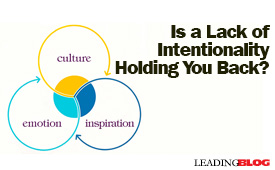
Posted by Michael McKinney at 09:07 AM
Permalink
| Comments (0)
| Books
, Leadership
09.15.06

Education News from Dubai and India

A couple of links from Dubai's Gulf News concerning education in Dubai and India:
- Dubai: Unique Chance to Learn About Great Leadership
Pupils in Dubai secondary schools will have an opportunity to participate in a unique educational, cultural, and scientific competition during the new academic year. The contest is about the book, My Vision: Challenges in the Race for Excellence, by His Highness Shaikh Mohammad Bin Rashid Al Maktoum, Vice-President and Prime Minister of the UAE and Ruler of Dubai.
The objective of distributing the book to all secondary schools is to create a healthy competition among pupils and to teach the new generation lessons of "great leadership", said Ahmad Al Attar, Executive Director of the "My Vision, My Future" project.
The book offers a detailed account of the vision that transformed Dubai and the UAE into international hubs for commerce and finance. His Highness holds Dubai up as an example of extraordinary development based on excellent leadership, management, teamwork, and timely decision-making.
The author, whose personal involvement in the process of development served as the basis for his work, also reflects on the current state of the Arab nation, which he describes as suffering from “a crisis of leadership and management". The book will be released in English in the near future.
- India: Schools "Must Teach Core Values of Life"
Anubha Nijhawan, Principal of the Indian Public High School in Ras Al Khaimah, received the Indian national teacher's award. She said cultural values should be given a prime place in schools.
She believes that traditional values should be revived in schools to enable students to lead their lives with a conscious awareness of their culture. "So that they are able to face the challenges presented to them from all aspects," Nijhawan said.
In her view, nowadays youngsters are highly exposed to media and it could adversely affect their personalities. "The challenge is to maintain the student's personality. Education has a very significant role in teaching students the core values of life," she added. The world, she said, is changing rapidly and there is a keen need to "deepen the importance of maintaining our culture."
* * * |
Posted by Michael McKinney at 06:37 PM
Permalink
| Comments (0)
| NewsWire
09.14.06

Case Dismissed
A reoccurring distraction that often haunts people is forgiveness. When we have been wronged we want it made right. We want absolution, resolution, restitution or at least an adequate apology. Unfortunately in life this almost never happens. Life isn’t fair. Dwelling on this takes our mind off of the goal. Fundamentally, it is an issue of pride. In the new book Success Built to Last the authors provide a good commentary on this issue. “Successful people do not try to rewrite history or to wipe the slate clean. They don’t pretend it didn’t happen. They simply decide to dismiss the case and move on. Obsessing on grudges keeps them alive; letting them go forces them to die as you get back to business.” They continue:
The root of the word “forgive” is actually to send away—to dismiss.
“Dismiss” is a very strong word,” said Reverend Deborah Johnson. “When something is dismissed, it’s over. When it’s dismissed, you don’t keep going back over it.” That’s what successful people do. They don’t necessarily call it forgiveness, but they do abandon blame as a way of life.
“Now there’s a funny thing about this notion of dismissing the case. When you’re in a court of law and, at some point, the judge says ‘case dismissed,’ that doesn’t mean case erased. There will still be a record of the case in the books. But what isn’t going to happen is we’re not going to keep going through the particulars of this case. Dismissed doesn’t mean that all parties in it experience resolution. It doesn’t mean that a crime didn’t take place.” When the judge dismisses the case, it’s because there will be no more presentation at this point. “It’s over,” she insisted.
My mother used to say, “You don’t forgive to let the other person off the hook, you forgive to let yourself off the hook.” Good advice.
Posted by Michael McKinney at 12:53 AM
Permalink
| Comments (0)
| Books
, Personal Development
09.11.06

September 11, 2006

September 11th is a tragedy that struck all of us. It caused us to look deeper inside ourselves to see what we had and what we lacked. As any crisis reveals, leadership is something that is built over time and not something you dream up on a moments notice. A lot of character was revealed and developed that day.
* * * |
Posted by Michael McKinney at 10:35 AM
Permalink
| Comments (0)
| Leadership
, NewsWire
09.07.06

Leading Change: Our Iceberg is Melting
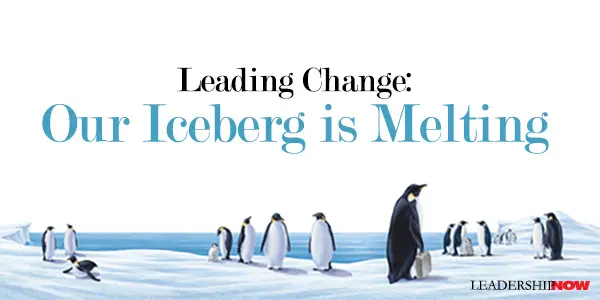
H ARVARD BUSINESS SCHOOL'S leadership and change guru, John Kotter, has created a very useful and accessible fable for change. Our Iceberg Is Melting will appeal to people at all levels of an organization. The lessons you can draw from this book will serve you well on the job, in your family, and in your community.
There is really no organization that is not faced with a changing situation. Technology and globalization are perhaps the biggest issues impacting most organizations today. The difficulties that loom for creating that change can be intimidating. Kotter weaves an eight-step process for successful change through the story. These steps can help you get your mind around the change process.
SET THE STAGE:
1. Create a sense of urgency. (not panic) “Problem. What Problem?” Take the issue to the right people.
2. Pull together the guiding team. This team must be strong enough to guide the change—leadership skills, credibility, communications ability, authority, analytical skills and a sense of urgency. If you look at the companies that are good at initiating a major change, increasingly you'll find that it doesn’t work if the top few try to do all the heavy lifting.
DECIDE WHAT TO DO:
3. Develop the vision and change strategy. Change to what? Too many change initiatives might indicate that you haven’t done this step well. You’ll get change burnout and more resistance.
MAKE IT HAPPEN:
4. Communicate for understanding and buy-in.
5. Empower others to act. Remove barriers so that people can act on the new direction. Get the “junk” out of the way to get the momentum. Empowerment, but not a free-for-all—competent training may be called for.
6. Produce short-term wins. It’s critical because you always have skeptics. Tangible success will help to drain the power from these people and bring them on board.
7. Don’t let up. Even after the win, keep up the pressure to keep the momentum going. Be relentless until you reach the end goal.
8. Create a new culture. Make sure that it sticks—internalized.
The book helps you to see change differently. The importance of emotions in the change process is emphasized. As recent discoveries about the brain have affirmed, the emotional side of how change happens can have a great impact on a successful change initiative. This is a great story and sure to generate discussion ... and change! Check it out.

* * *  Like us on Instagram and Facebook for additional leadership and personal development ideas.
* * *
>

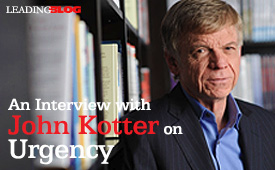 
Posted by Michael McKinney at 12:48 AM
Permalink
| Comments (0)
| Books
, Change
09.04.06

Great Expectations
Samuel Johnson lamented that, “Tongues, like governments, have a natural tendency to degeneration.”
Michael Curtin, Vice Chairman, COO and Associate Publisher of The Columbus Dispatch, spoke recently on the degradation of language:
Of course, we know that all living languages change. They must to survive. Language never is what it was in the good old days. The real question is what constitutes change and what is decay.
There is abundant evidence that the American people are growing more worried about language decay—an increase in casual profanity, rudeness and incivility in our expression.
The Associated Press reported recently that three-fourths of Americans say they encounter profanity in public either occasionally or frequently, and a majority agreed they encounter it noticeably more often than 20 years ago.
Words that once were shocking to hear in public now are heard commonly on television and radio, in music and movies, at work and on the street.
Are we on an irreversible downward slope?
Interestingly enough over on the Christianity Today Blog they have been debating for months as to whether a young poet should have been allowed to use the F-word throughout the public recitation of her poem at church. Oddly, the debate is all over the place. I know the poet’s pastor thought that he was being caring, loving and accepting, but in the end he failed her. He was disrespectful to the young girl by allowing her to recite the poem with all of its profanity intact.
To be sure, a leader needs to be accepting of those they lead. They need to try to relate to and understand those they lead. But more importantly, they need to be respectful and they need to expect the best of their people—or they will seldom get it. 
If in trying to be accepting, we lower the bar and drop the standards, we all lose. Perhaps in the short-term this seems to work but in the end it backfires—we lose ground and respect. Unfortunately, we see this kind of misguided thinking happening in homes, schools, companies and yes, even churches.
In short, the pastor sent the message that she was not capable of coming up to a standard that is acceptable to society at large. Apparently her pastor didn’t feel she was talented enough to express herself in a proper manner. It is insulting.
If a leader is to make a difference they must act courageously. Upholding standards is not always easy but it is necessary. Emerson wrote, “Trust men and they will be true to you; treat them greatly and they will show themselves great.” We need to have enough respect for the people we lead to expect the best from them. What we expect is all too often, exactly what we get.
Posted by Michael McKinney at 10:23 AM
Permalink
| Comments (0)
| Leadership
09.03.06

Leadership Books: September 2006
Here's a roundup of some of the best leadership books being released in September. For a look a little further out see the Fall/Winter 2006 releases.
 Leadership Divided Leadership Divided : What Emerging Leaders Need and What You Might Be Missing by Ron A. Carucci
 Success Built to Last Success Built to Last: Creating a Life That Matters by Jerry Porras, Stewart Emery and Mark Thompson
 You Don't Need a Title To Be a Leader You Don't Need a Title To Be a Leader : How Anyone, Anywhere, Can Make a Positive Difference by Mark Sanborn
 Social Intelligence Social Intelligence : The New Science of Human Relationships by Daniel Goleman
 Taking Advice Taking Advice: How Leaders Get Good Counsel And Use It Wisely by Dan Ciampa
    
Posted by Michael McKinney at 10:38 AM
Permalink
| Comments (0)
| Books
|
 |
BUILD YOUR KNOWLEDGE
ADVERTISE WITH US


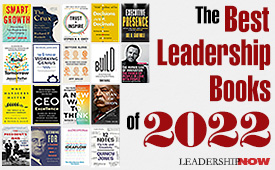


How to Do Your Start-Up Right
STRAIGHT TALK FOR START-UPS



Grow Your Leadership Skills
NEW AND UPCOMING LEADERSHIP BOOKS

Leadership Minute
BITE-SIZE CONCEPTS YOU CAN CHEW ON

Classic Leadership Books
BOOKS TO READ BEFORE YOU LEAD
|
 |
|


















